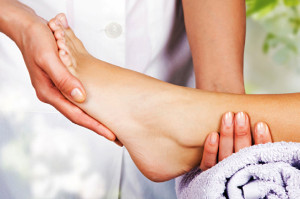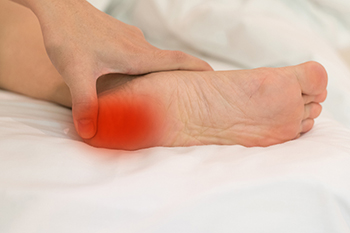Connect With Us
Blog
Items filtered by date: July 2022
Foot Massages 101

Foot massages can be a useful and important component of a foot therapy routine. Foot massages can have a range of potential benefits. Not only might such massages improve blood circulation, but they could also be an effective form of stress relief. Foot massages usually begin with the washing and drying of the feet. It is important to additionally apply lotion and moisturizer to the feet following the wash. Then, you can hold the foot with both hands, using small circular movements to gently apply pressure to the toes. You might massage down the arch of the foot and then up the heel and ankle. You might also want to loosen the joints of your feet in your ankle and toes by gently moving them in circles. Following the massage, you may find that you have a better sense of balance when walking and moving. Of course, foot massages are only one kind of foot therapy that you may benefit from. For more information on foot massages and their benefits, contact a podiatrist.
Foot therapy is often necessary for those recovering from either foot deformities or foot injuries. If you have concerns regarding therapy, consult with one of our podiatrists from Podiatry Care Specialists. Our doctors can provide the care you need to keep you pain-free and on your feet.
Most Common Injuries
People who are active or athletes are prone to a variety of injuries. Therefore, it is often important to take part in physical therapy in order to quickly get back on the right track.
What to Do When Injured
Physical Therapy – This specialized treatment will focus on the affected area, speeding up recovery and the overall healing process. It is a proven method that has helped millions of people return from any injury.
During physical therapy you will undergo regimented training to get back into full form. Training is often very difficult, especially at first when the foot feels weak. Physical therapy often involves:
Basic stretching and twisting exercises – getting the feet’s mobility and flexibility up.
Massaging – the therapist will massage the injured area in order to activate the muscles and relax them.
Strengthening Exercises – this allows the muscles in the affected area to regain their full strength, a vital step towards full recovery.
If you have any questions please feel free to contact our offices located in West Chester, and Broomall, PA . We offer the newest diagnostic tools and technology to treat your foot and ankle needs.
The Link Between Obesity and Foot Pain

Just like any other medical disease or condition, foot pain is associated with several risk factors. This is to say that carrying a certain attribute makes one more likely to suffer from foot pain. For instance, pregnant women and arthritic individuals are at a higher risk of experiencing foot pain. One often overlooked high risk group is obese individuals. Once one’s body mass index has increased, the incidence of plantar heel pain increased. Likewise, fat mass is positively correlated with foot pain. Obese individuals are also more likely to have flat feet as well. This is likely the case because obese people place more weight and force down onto their feet, pushing down any natural arch so that the entire foot lays flush against the ground. If you are obese, you can reach out to a podiatrist to assist you with any foot pain you might have.
The more you weigh, the harder your feet must work to support your body. If you’re an obese individual and are concerned about your feet, contact one of our podiatrists from Podiatry Care Specialists. Our doctors can provide the care you need to keep you pain-free and on your feet.
Obesity and Your Feet
People who are overweight are putting more pressure on their ankles, knees, and hips as well as their feet. This unfortunately can lead to variety of different issues.
Problems & Complications Stemming from Obesity
- When the body is overweight, it tries to compensate by changing the way that it moves. An obese person may lean forward and put extra weight on the wrong part of the foot. This puts unnecessary stress on the feet.
- Obese people are also more likely to develop type II diabetes which is a condition that causes a lot of foot problems. People with diabetes often don’t feel the cuts and sores that they may have on their feet, which can lead to more complicated and severe issues.
- Plantar fasciitis is another foot condition that can be caused by obesity. Plantar fasciitis is an inflammation of the tissue along the bottom of the foot, which causes pain and stiffness while walking and climbing stairs.
If you have any questions, please feel free to contact our offices located in West Chester, and Broomall, PA . We offer the newest diagnostic and treatment technologies for all your foot care needs.
Arthritis Can Cause Pain in the Feet and Ankles
The Relationship Between Running and Swollen Feet
 Swollen feet is undoubtedly an uncomfortable and unpleasant condition that can affect many people. While pregnant women and those who suffer from diabetes are famously prone to suffering from swollen feet, runners may experience this condition. Runners’ feet may swell both during and after runs for a number of reasons. First, tight and restrictive running shoes can contribute to swelling. Since ill-fitting shoes often squeeze the toes and heels, muscles in the feet become overwhelmed in trying to maintain balance while running, resulting in swelling. Be sure to select the right pair of comfortable running shoes that match your foot type to avoid this pitfall. Additionally, runners’ feet may swell up if they are simply running with poor technique. For example, if a runner lands on their heels instead of the balls of their feet during their runs, they can essentially place more pressure on the bottoms of their feet, which can lead to foot swelling. If you find yourself suffering from swollen feet after runs, you might try applying ice to your feet to reduce the swelling or even elevating your feet. A podiatrist may be able to help you manage this condition and help you mitigate its effects.
Swollen feet is undoubtedly an uncomfortable and unpleasant condition that can affect many people. While pregnant women and those who suffer from diabetes are famously prone to suffering from swollen feet, runners may experience this condition. Runners’ feet may swell both during and after runs for a number of reasons. First, tight and restrictive running shoes can contribute to swelling. Since ill-fitting shoes often squeeze the toes and heels, muscles in the feet become overwhelmed in trying to maintain balance while running, resulting in swelling. Be sure to select the right pair of comfortable running shoes that match your foot type to avoid this pitfall. Additionally, runners’ feet may swell up if they are simply running with poor technique. For example, if a runner lands on their heels instead of the balls of their feet during their runs, they can essentially place more pressure on the bottoms of their feet, which can lead to foot swelling. If you find yourself suffering from swollen feet after runs, you might try applying ice to your feet to reduce the swelling or even elevating your feet. A podiatrist may be able to help you manage this condition and help you mitigate its effects.
Swollen feet can be a sign of an underlying condition. If you have any concerns, contact one of our podiatrists of Podiatry Care Specialists. Our doctors can provide the care you need to keep you pain-free and on your feet.
Swollen feet are a common ailment among pregnant women and people who stand or sit for extended periods. Aging may increase the possibility of swollen feet and patients who are obese often notice when their feet are swelling too. There may be medical reasons why swollen feet occur:
- Phlebitis - A condition that causes the veins to become inflamed and can also cause leg pain.
- Liver disease - This may lead to low blood levels of albumin which is a protein. This can cause fluid in the blood to pass into the tissues and several areas of the body can become swollen.
- Heart failure - When the heart doesn’t pump properly the blood that is normally pumped back to the heart can pool in the veins of the legs causing swollen feet.
- Kidney disease - One of the main functions of the kidneys is releasing excess fluid in the body. This type of condition can make it difficult for the kidneys to function properly, and as a result the feet may become swollen.
- Deep-vein thrombosis (DVT)- This is a serious condition where blood clots form in the veins of the legs. They can block the return of blood from the legs to the heart which may cause the feet to swell. It is important to be treated by a podiatrist if this condition is present.
Swollen feet can also be caused by bone and tendon conditions, including fractures, arthritis, and tendinitis. Additionally, there may be skin and toenail conditions and an infection may cause the feet to swell. Patients who take medicine to treat high blood pressure may be prone to getting swollen feet.
Many patients elevate their feet to help relieve the swelling and this is generally a temporary remedy. When a podiatrist is consulted the reason behind the swelling can be uncovered and subsequently treated.
If you have any questions please feel free to contact our offices located in West Chester, and Broomall, PA . We offer the newest diagnostic tools and technology to treat your foot and ankle needs.
Could Corticosteroid Injections Help My Heel Pain?

Heel pain is a common complaint among many patients visiting a podiatrist. Although there are several possible causes of this heel pain, plantar fasciitis is the likeliest. Plantar fasciitis is an inflammation of the plantar fascia tissue on the sole of the foot. This tissue connects the heel with the forefoot and can suffer damage from overuse, complications due to abnormal foot structure, improper footwear, and more. Plantar fasciitis can affect all people from athletes to ordinary people leading fairly sedentary lives. Older or obese individuals, those who stand while working, or who have flat feet or a shortened Achilles tendon, have a higher risk of developing plantar fasciitis. There are many treatment modalities that your podiatrist may discuss with you if it's determined that plantar fasciitis is the cause of your heel pain. If it's chronic and does not respond to more conservative treatments, your podiatrist may suggest corticosteroid injections. This type of anti-inflammatory medicinal treatment is believed to help reduce pain and inflammation in many patients. If you are suffering from heel pain, have a podiatrist examine you. If you are diagnosed with plantar fasciitis, consider all of the treatment options your podiatrist suggests and ask for information about whether corticosteroid injections might be right for you.
Plantar fasciitis can be very painful and inconvenient. If you are experiencing heel pain or symptoms of plantar fasciitis, contact one of our podiatrists from Podiatry Care Specialists. Our doctors can provide the care you need to keep you pain-free and on your feet.
What Is Plantar Fasciitis?
Plantar fasciitis is the inflammation of the thick band of tissue that runs along the bottom of your foot, known as the plantar fascia, and causes mild to severe heel pain.
What Causes Plantar Fasciitis?
- Excessive running
- Non-supportive shoes
- Overpronation
- Repeated stretching and tearing of the plantar fascia
How Can It Be Treated?
- Conservative measures – anti-inflammatories, ice packs, stretching exercises, physical therapy, orthotic devices
- Shockwave therapy – sound waves are sent to the affected area to facilitate healing and are usually used for chronic cases of plantar fasciitis
- Surgery – usually only used as a last resort when all else fails. The plantar fascia can be surgically detached from the heel
While very treatable, plantar fasciitis is definitely not something that should be ignored. Especially in severe cases, speaking to your doctor right away is highly recommended to avoid complications and severe heel pain. Your podiatrist can work with you to provide the appropriate treatment options tailored to your condition.
If you have any questions please feel free to contact our offices located in West Chester, and Broomall, PA . We offer the newest diagnostic and treatment technologies for all your foot and ankle needs.

